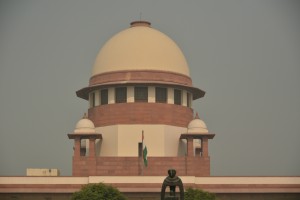Supreme Court: With the intent to prevent the arbitrary exercise of judicial discretion under Order 37 CPC while refusing the leave to defend or granting conditional or unconditional leave to defend, the bench of Kurian Joseph and R. F. Nariman, JJ laid down broad guidelines to be kept into mind by the trial judge. The Guidelines are as follows:
- If the defendant satisfies the Court that he has a substantial defence, that is, a defence that is likely to succeed, the plaintiff is not entitled to leave to sign judgment, and the defendant is entitled to unconditional leave to defend the suit;
- If the defendant raises triable issues indicating that he has a fair or reasonable defence, although not a positively good defence, the plaintiff is not entitled to sign judgment, and the defendant is ordinarily entitled to unconditional leave to defend;
- Even if the defendant raises triable issues, if a doubt is left with the trial judge about the defendant’s good faith, or the genuineness of the triable issues, the trial judge may impose conditions both as to time or mode of trial, as well as payment into court or furnishing security. Care must be taken to see that the object of the provisions to assist expeditious disposal of commercial causes is not defeated. Care must also be taken to see that such triable issues are not shut out by unduly severe orders as to deposit or security;
- If the Defendant raises a defence which is plausible but improbable, the trial Judge may impose conditions as to time or mode of trial, as well as payment into court, or furnishing security. As such a defence does not raise triable issues, conditions as to deposit or security or both can extend to the entire principal sum together with such interest as the court feels the justice of the case requires.
- If the Defendant has no substantial defence and/or raises no genuine triable issues, and the court finds such defence to be frivolous or vexatious, then leave to defend the suit shall be refused, and the plaintiff is entitled to judgment forthwith
- If any part of the amount claimed by the plaintiff is admitted by the defendant to be due from him, leave to defend the suit, (even if triable issues or a substantial defence is raised), shall not be granted unless the amount so admitted to be due is deposited by the defendant in court.
Stating that Order 37 CPC has suffered a change in 1976, and that change has made a difference in the law laid down, the Court said that the position in law now is that the trial Judge is vested with a discretion which has to result in justice being done on the facts of each case. The Court explained that at one end of the spectrum is unconditional leave to defend, granted in all cases which present a substantial defence. At the other end of the spectrum are frivolous or vexatious defences, leading to refusal of leave to defend. In between these two extremes are various kinds of defences raised which yield conditional leave to defend in most cases. It is these defences that have to be guided by broad principles which are ultimately applied by the trial Judge so that justice is done on the facts of each given case. [IDBI Trusteeship Services Ltd v. Hubtown Ltd, 2016 SCC OnLine SC 1274, decided on 15.11.2016]

